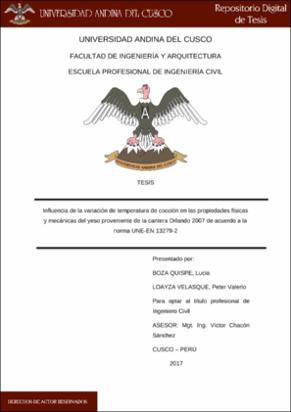| dc.contributor.advisor | Chacón Sánchez, Víctor | |
| dc.contributor.author | Boza Quispe, Lucia | |
| dc.contributor.author | Loayza Velasque, Peter Valerio | |
| dc.date.accessioned | 2018-03-28T22:11:28Z | |
| dc.date.available | 2018-03-28T22:11:28Z | |
| dc.date.issued | 2017-12-28 | |
| dc.identifier.citation | APA | es_PE |
| dc.identifier.uri | https://hdl.handle.net/20.500.12557/1363 | |
| dc.description.abstract | El presente trabajo de investigación tuvo como propósito determinar la influencia de la variación de la temperatura de cocción del yeso (130°C, 200°C,
500°C, 900°C y 1100°C) en sus propiedades físicas y mecánicas tomando como referencia la norma UNE.EN 13279-2 Yesos de construcción y conglomerantes a base de yeso para la construcción. Parte 2: Métodos de ensayo. Haciendo uso de la materia prima obtenida de la Cantera Orlando 2007. Para realizar la investigación primero se fabricó el yeso a diferentes temperaturas de calcinación, luego se determinó la relación agua/yeso conveniente que facilitó la evaluación de las propiedades físicas y mecánicas en los diferentes tipos de yeso. Se realizaron 36 unidades prismáticas utilizadas en el ensayo de resistencia a flexión, y los 2 trozos de cada unidad se reutilizaron en el ensayo de resistencia a compresión. De igual forma se fabricaron 36 unidades para el ensayo de Succión y finalmente se utilizó 7 kg de yeso pasante por la malla N° 50 para el ensayo de tiempo de fraguado. Al término de la investigación se llegó a la conclusión de que las propiedades físicas y mecánicas del yeso se ven afectadas significativamente por la variación de temperatura de cocción. | es_PE |
| dc.description.abstract | This research work was made to determinate the influence of variation of calcination temperature of the gypsum (130 ° C, 200 ° C, 500 ° C, 900 ° C and 1100 ° C) in its physical and mechanical properties. Taking as reference the European Standard Norme UNE.EN 13279-2: Gypsum binders and gypsum plasters. Part 2: Test methods. Using the raw material obtained from the Orlando 2007 Quarry. To carry out this research, gypsum was first manufactured at different calcination temperatures. To make easier the evaluation of the physical and mechanical properties in the different types of gypsum a suitable water/gypsum ratio was disposed. Then 36 prismatic units were manufactured to used them in the flexural resistance test, and the 2 pieces of each unit were reused in the compression resistance test. Likewise, 36 units were manufactured for the suction test. And finally, 7 kg of gypsum that passed through the mesh #50 was used for the setting time test. At the end of the research the conclusion was that physical and mechanical properties of the gypsum are significantly affected by the variation of calcination temperature. | en_US |
| dc.description.uri | Tesis | es_PE |
| dc.format | application/pdf | es_PE |
| dc.language.iso | spa | es_PE |
| dc.publisher | Universidad Andina del Cusco | es_PE |
| dc.rights | info:eu-repo/semantics/openAccess | es_PE |
| dc.rights.uri | https://creativecommons.org/licenses/by-nc-nd/2.5/pe/ | es_PE |
| dc.source | Universidad Andina del Cusco | es_PE |
| dc.source | Repositorio Institucional - UAC | es_PE |
| dc.subject | Yeso | es_PE |
| dc.subject | Temperatura-Cocción | es_PE |
| dc.subject | Propiedad-Físico-Mecánicas | es_PE |
| dc.subject | Unidades prismáticas-Yeso | es_PE |
| dc.title | Influencia de la variación de temperatura de cocción en las propiedades físicas y mecánicas del yeso proveniente de la cantera Orlando 2007 de acuerdo a la norma UNE-EN 13279-2. | es_PE |
| dc.type | info:eu-repo/semantics/bachelorThesis | es_PE |
| thesis.degree.name | Ingeniero Civil | es_PE |
| thesis.degree.grantor | Universidad Andina del Cusco. Facultad de Ingeniería y Arquitectura | es_PE |
| thesis.degree.level | Titulo Profesional | es_PE |
| thesis.degree.discipline | Ingeniería Civil | es_PE |


